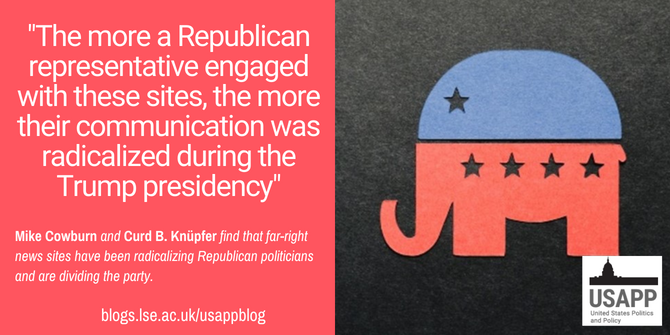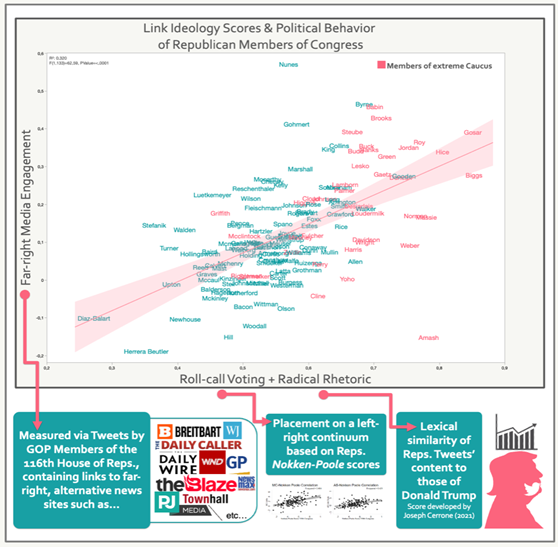
 The last 15 years have seen the Republican Party move farther to the right than its Democratic counterpart has moved to the left. Could the GOP’s embrace of more radical policy preferences and a more combative communication style be linked to the rise of far-right media websites? In new research, Mike Cowburn and Curd B. Knüpfer track the influence of far-right news websites on Republican members of Congress. They find that the more a Republican House representative engaged with these sites, the more their communication was radicalized during the Trump presidency.
The last 15 years have seen the Republican Party move farther to the right than its Democratic counterpart has moved to the left. Could the GOP’s embrace of more radical policy preferences and a more combative communication style be linked to the rise of far-right media websites? In new research, Mike Cowburn and Curd B. Knüpfer track the influence of far-right news websites on Republican members of Congress. They find that the more a Republican House representative engaged with these sites, the more their communication was radicalized during the Trump presidency.
Republican intra-party conflict was again in the news at the start of this year, with an important minority of US House representatives refusing to support the election of Speaker Kevin McCarthy across fifteen rounds of voting. Recognition of the party’s internal conflicts has been growing among media commentators and academics since the emergence of Tea Party in 2009. The past decade has also been marked by a broad acknowledgement that the Republican Party has become increasingly radical in policy preferences, communication style, and (non-)adherence to democratic norms. This period has also witnessed a rise in far-right alternative news sources, which promote conspiratorial beliefs.
Our research shows that Republican members of Congress frequently refer to these far-right news sources. Representatives who are identifiably on the right of the party share more content from “alternative media” sources online. We argue that this marks an emerging fault line within the GOP. Not all Republican politicians are willing to engage with this far-right content. And those that do are noticeably further to the right on other measures, such as voting behavior and membership of ideological groups like the House Freedom Caucus.
Importantly, we show that the more a Republican representative engaged with these sites, the more their communication was radicalized during the Trump presidency. This trend has important implications for both asymmetric polarization and Republican intra-party division. Many Republican politicians are increasingly catering to niche and hyperpartisan news environments which incentivize them to adopt more radical positions.

Photo by Kelly Sikkema on Unsplash
(Many) Republicans Share Far-Right Media Online
In our research, we analyze hyperlinks to news sources found on the Twitter feeds of Republican House Members in the 116th Congress. Because ideological positions are contestable, we use three independent approaches to classify the links we find. Our first metric gauges the partisanship of websites by identifying whether audiences that link to them tilt liberal or conservative. The second metric classifies sites according to crowdsourced and expert-based evaluations of partisan bias. The third metric is a smaller sample of qualitatively assessed collection of websites deliberately presenting themselves as a right-wing “alternative” to more established media sources. Sites such as Breitbart, The Daily Caller and The Federalist were identified as right-wing under all three metrics. These sites have been shown to have influenced the wider media ecosystem and agenda since 2016.
Having identified representatives’ online media patterns, we are able to position Republican politicians based on their media diet. The positions on scales are closely linked to representatives’ behavior in Congress and align with other measures of online communication.
Media Consumption Aligns with Radicalization
Our scales are very good at predicting the increasing radicalization of how individual members of Congress communicate. Given Trump’s dominance over the GOP since taking office and his unusual, if not unique, rhetorical approach, we consider similarity with his language as evidence of rhetorical radicalization. Using an approach developed by George Washington PhD student Joseph Cerrone, we compare representatives’ language to that of Donald Trump. Even controlling for factors such as voting record, caucus membership, district partisanship, racial and economic factors, our media scales were the strongest predictor of an increasingly Trumpian communicative style. Put simply, engaging with far-right alternative news was closely associated with radicalization.
Figure 1 – Link ideology scores and political behavior of Republican members of Congress

An Asymmetric Media Environment
Contemporary US politics is increasingly marked by forms of asymmetric polarization. This means that one party—the GOP—is shifting rightward far more quickly than its Democratic counterpart is moving to the left. In recent years, similar trends have been emerging in other democratic countries.
How can this radicalization be explained? Though there are doubtless multiple causes at work here, our research demonstrates that the shifting information environment, which (some) elites cater to for attention, is supplying them with agenda items and talking points shared by their potential constituents. As data on shifting news consumption dynamics indicate, many Republican voters are also increasingly tapping into an alternative sphere of information production. Here too, a vast alternative informational ecosystem has emerged on the right, with no equivalent counterpart on the American left, either in size or connection to the formal apparatus of the Democratic Party.
The effects of these novel forms of connectivity between emerging ideological, highly partisan actor types and political parties is still understudied. More work needs to be done to explain the mechanisms by which a changing information environment might foster or incentivize forms of political posturing and pull politicians to embrace more extreme positions.
- This article is based on the paper ‘The Emerging Fault Line of Alternative News: Intra-Party Division in Republican Representatives’ Media Engagement’ in Party Politics.
- Please read our comments policy before commenting.
- Note: This article gives the views of the author, and not the position of USAPP – American Politics and Policy, nor the London School of Economics.
- Shortened URL for this post: https://bit.ly/3nxZrSA





